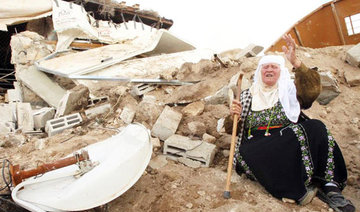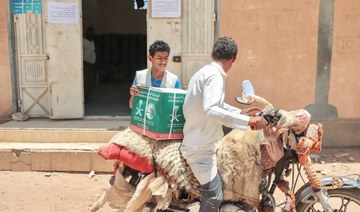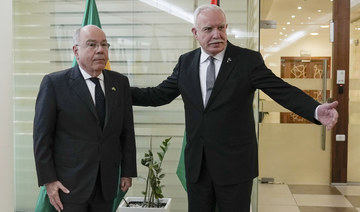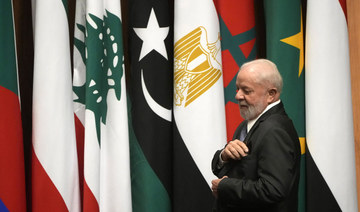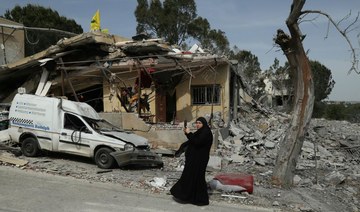JERUSALEM: Israeli authorities have demolished three homes and sealed off a fourth of Palestinians who carried out attacks that killed a soldier and a policewoman, the army said on Thursday.
Israel regularly carries out such demolitions, which it says act as a deterrent, but human rights groups and Palestinians say they punish families for the actions of relatives.
Two houses were demolished in Deir Abu Mashaal, near Ramallah in the occupied West Bank, and a third was sealed off, an army spokeswoman said.
Village mayor Emad Zahran told AFP Israeli soldiers entered the area around 2:00 am (2300 GMT Wednesday) with bulldozers.
On June 16, three villagers carried out an attack outside Jerusalem’s Old City that killed a policewoman.
According to police, two of the assailants opened fire at a group of officers who returned fire, and a third stabbed the border policewoman a short distance away before being shot.
All three attackers were killed.
A home in the West Bank town of Silwad was also demolished in response to an April 6 car-ramming attack near the Jewish settlement of Ofra that killed an Israeli soldier.
A wave of unrest that broke out in October 2015 has killed 293 Palestinians or Arab Israelis, 47 Israelis, two Americans, two Jordanians, an Eritrean, a Sudanese and a Briton, according to an AFP toll.
Israeli authorities say most of the Palestinians killed were carrying out knife, gun or car-ramming attacks.
Others were shot dead during protests or clashes, while some were killed in Israeli air strikes on the Gaza Strip.
The violence had greatly subsided but tension around the highly sensitive Al-Aqsa mosque in Jerusalem saw a spike in July.
Israel demolishes homes of Palestinian attackers
Israel demolishes homes of Palestinian attackers

Egypt to host Sudan peace conference next month

- The ministry said it was part of Egypt’s “unremitting efforts and endeavors” to put an end to the ongoing war in Sudan
- The conference will be held in the presence of relevant regional and international partners
CAIRO: Egypt will next month host representatives of Sudan’s civil and political groups in a bid to bring peace and stability to the country, the Egyptian Foreign Ministry said.
The offer to hold the event stemmed from the belief that the “current conflict in Sudan is basically a Sudanese issue and that any future political process should include all national stakeholders on the Sudanese scene, and within the framework of respecting the principles of Sudan’s sovereignty, unity and territorial integrity, non-interference in its internal affairs, and preserving the state and its institutions,” the ministry said.
The conference will be held in the presence of relevant regional and international partners and seek to achieve consensus among Sudanese forces on ways to build a comprehensive and lasting peace.
The ministry said it was part of Egypt’s “unremitting efforts and endeavors” to put an end to the ongoing war in Sudan and within a framework of cooperation and integration with the efforts of regional and international partners, especially Sudan’s neighboring countries, the parties to the Jeddah talks, the UN, African Union, Arab League and the Intergovernmental Authority on Development, an eight-country trade bloc in Africa.
Egypt looked forward to the effective participation of all and concerted efforts to ensure the conference succeeded in achieving the aspirations of the Sudanese people, it said.
Brazil recalls ambassador to Israel: diplomatic source

- Relations between Brazil and Israel have soured over the conflict
BRASILIA: Brazil has recalled its ambassador to Israel and will not immediately appoint a replacement, a diplomatic source told AFP Wednesday, ratcheting up tensions between the two countries over Israel’s war in Gaza.
Relations between Brazil and Israel have soured over the conflict, with Brazilian President Luiz Inacio Lula da Silva in February accusing the Israeli government of “genocide.”
Israel reacted furiously, declaring the Brazilian leader “persona non grata.”
Israel had previously summoned the South American country’s ambassador Frederico Meyer to a meeting at the Yad Vashem Holocaust memorial center in Jerusalem, which the Brazilian source said “was a humiliation to which (Meyer) was subjected.”
In response, Brazil recalled Meyer for consultations, and in turn summoned Israel’s representative in Brasilia.
The source said conditions had not been met for Meyer “to return” to Israel.
The Brazilian representation in Israel in the meantime will be led by diplomat Fabio Farias.
Lebanon backtracks on ICC jurisdiction to probe alleged war crimes

- Lebanon has accused Israel of repeatedly violating international law since October
- Foreign Minister Abdallah Bou Habib never filed the requested declaration
BEIRUT: Lebanon has reversed a move to authorize the International Criminal Court to investigate alleged war crimes on its soil, prompting a prominent rights group to deplore what it called the loss of an “historic opportunity” for justice.
Lebanon has accused Israel of repeatedly violating international law since October, when the Israeli military and Lebanese armed group Hezbollah began trading fire in parallel with the Gaza war. Israeli shelling has since killed around 80 civilians in Lebanon, including children, medics and reporters.
Neither Lebanon nor Israel are members of the ICC, so a formal declaration to the court would be required from either to give it jurisdiction to launch probes into a particular period.
In April, Lebanon’s caretaker cabinet voted to instruct the foreign ministry to file a declaration with the ICC authorizing it to investigate and prosecute alleged war crimes on Lebanese territory since Oct. 7.
Foreign Minister Abdallah Bou Habib never filed the requested declaration and on Tuesday the cabinet published an amended decision that omitted mention of the ICC, saying Lebanon would file complaints to the United Nations instead.
Lebanon has regularly lodged complaints with the UN Security Council about Israeli bombardments over the past seven months, but they have yielded no binding UN decisions.
Habib did not respond to a Reuters question on why he did not file the requested declaration.
A Lebanese official, speaking on condition of anonymity, told Reuters the initial cabinet decision raised “confusion” over whether a declaration would “open the door for the court to investigate whatever it wanted across different files.”
The official said the request to revisit the decision came from George Kallas, a cabinet minister close to parliament speaker Nabih Berri, who heads the Shiite Muslim Amal movement that is allied with the politically powerful Hezbollah.
Hezbollah and Amal have both fired rockets into Israel, killing eight civilians and displacing around 60,000 people from towns near the border since October.
Contacted by Reuters, Kallas confirmed he requested a review of cabinet’s initial decision but denied it was out of fear Hezbollah or Amal could become subject to ICC arrest warrants.
Human Rights Watch condemned the cabinet’s reversal.
“The Lebanese government had a historic opportunity to ensure there was justice and accountability for war crimes in Lebanon. It’s shameful that they are forgoing this opportunity,” said HRW’s Lebanon researcher Ramzi Kaiss.
“Rescinding this decision shows that Lebanon’s calls for accountability ring hollow,” he told Reuters.
Information Minister Ziad Makary, the government spokesman, said that he had backed the initial decision and would “continue to explore other international tribunals to render justice” despite the reversal.
Lebanon backtracked a few days after the ICC requested arrest warrants over alleged war crimes for Israel’s prime minister and defense minister and three Hamas leaders.
The initial push to file an ICC declaration came from MP Halima Kaakour, who holds a PhD in public international law. She recommended the measure to parliament’s justice committee, which unanimously endorsed it. Cabinet approved it in late April.
“The political parties that backed this initiative at first seem to have changed their mind. But they never explained the reason to us or the Lebanese people,” Kaakour told Reuters.
“Lebanon’s complaints to the UN Security Council don’t get anywhere. We had an opportunity to give the ICC a period of time to look at it, we have the documentation — if we can use these international mechanisms, why not?”
Ancient Egyptians skulls reveal ‘extraordinary’ cancer surgery, study suggests

- Discovery gives ‘new perspective in our understanding of the history of medicine,’ says researcher
- Ancient civilization may have broken ‘medical knowledge frontier’ with precise treatment
LONDON: Ancient Egyptians may have discovered the existence of cancer and practiced surgery to treat it, a new study has found.
A team of international researchers studied two human skulls, discovering “extraordinary” evidence that places the already distinguished medical practices of Ancient Egypt in a new light.
Historical texts documenting medicine in Ancient Egypt already revealed tremendous knowledge, including the ability to treat disease, traumatic injury and dental issues.
But researchers say that the civilization may have broken through a “medical knowledge frontier” in treating cancer, Sky News reported.
Lead author Prof. Edgard Camaros, a paleopathologist at the University of Santiago de Compostela, said: “This finding is unique evidence of how ancient Egyptian medicine would have tried to deal with or explore cancer more than 4,000 years ago.
“This is an extraordinary new perspective in our understanding of the history of medicine.”
Scientists in the study examined two skulls held at the University of Cambridge’s Duckworth Collection.
The first, of a man estimated to be 30 to 35 years of age, was dated to between 2687 and 2345 B.C.
The second skull is of a woman older than 50, dated to between 663 and 343 B.C.
Microscopic viewing of the male skull showed a “big-sized lesion,” resulting in likely tissue destruction and about 30 metastasized lesions, said Tatiana Tondini, a researcher at the University of Tubingen.
But researchers later discovered cuts around the lesions, suggesting the precise medical use of a metal instrument.
“When we first observed the cutmarks under the microscope, we could not believe what was in front of us,” added Tondini, the first author of the study in the “Frontiers of Medicine” journal.
“We see that although ancient Egyptians were able to deal with complex cranial fractures, cancer was still a medical knowledge frontier.
“We wanted to learn about the role of cancer in the past, how prevalent this disease was in antiquity and how ancient societies interacted with this pathology.”
The female skull that was examined also featured a large lesion “consistent with a cancerous tumour that led to bone destruction,” Sky News reported.
The discovery may also lead to reappraisals of the proliferation of cancer and carcinogens throughout human history.
However, researchers cautioned against making definitive statements based on the study.
Prof. Albert Isidro, the study’s co-author and a surgical oncologist at the University Hospital Sagrat Cor, said: “It seems ancient Egyptians performed some kind of surgical intervention related to the presence of cancerous cells, proving that ancient Egyptian medicine was also conducting experimental treatments or medical explorations in relation to cancer.
“This study contributes to a changing of perspective and sets an encouraging base for future research in the field of paleo-oncology, but more studies will be needed to untangle how ancient societies dealt with cancer.”
Decade after Daesh horrors, Iraq’s Sinjar remains in ruins

- The area near the Syrian border still bears the scars of the fighting that raged there in 2014
- A decade on, the self-declared Daesh caliphate across Syria and Iraq is a dark and distant memory
SINJAR, Iraq: When Bassem Eido steps outside his modest village house in Iraq’s Sinjar district, he is reminded of the horrors that befell the majority-Yazidi region during Daesh group’s onslaught a decade ago.
The area near the Syrian border still bears the scars of the fighting that raged there in 2014 — bullet-riddled family homes with pancaked roofs and warning signs of the lethal threat of land mines and war munitions.
It was here that the militants committed some of their worst atrocities, including mass executions and sexual slavery, before a fightback driven by Kurdish forces dislodged them from the town of Sinjar by the following year.
A decade on, the self-declared Daesh caliphate across Syria and Iraq is a dark and distant memory, but the pain is raw in Eido’s largely abandoned village of Solagh, 400 kilometers (250 miles) northwest of Baghdad.
“Out of 80 families, only 10 have come back,” Eido told AFP in the desolate village which was once famed for its flourishing grape vines. “The rest say there are ... no homes to shelter them. Why would they return?“
A walk through Solagh reveals collapsed homes overgrown with wild scrub and the rusting skeletons of destroyed plumbing systems scattered amid the dust and debris.
“How can my heart be at peace?” said Eido, a 20-year-old Yazidi. “There is nothing and no one that will help us forget what happened.”
After liberation, Eido honored his father’s wish to spend his final days at their home and agreed to move back in with him. Their house was ravaged by fire but still standing and could be rebuilt with help from an aid group.
Most people cannot afford to rebuild, said Eido, and some camp in tents in the ruins of their homes. However, if large-scale reconstruction started, he predicted, “everyone would come back.”
Such efforts have been slowed by political infighting, red tape and other structural problems in this remote region of Iraq, a country still recovering from decades of dictatorship, war and instability.
Many who fled the Daesh moved to vast displacement camps, but the federal government this year announced a July 30 deadline to close them.
Baghdad promised financial aid to returning families and has vowed to ramp up reconstruction efforts. The migration ministry said recently that hundreds had returned to their homes.
However, more than 183,000 people from Sinjar remain displaced, the International Organization for Migration said in a recent report.
While most areas have seen “half or fewer” of their residents come back, it said, “13 locations have not recorded returns since 2014.”
Local official Nayef Sido said that villages “are still razed to the ground and the majority of the people haven’t received compensation.”
Some returnees are leaving again because, with no jobs, they cannot make ends meet, he added.
All of this only adds to the plight of the Yazidis, an ethnic and religious minority that suffered the brunt of Daesh atrocities, with thousands killed and enslaved.
In the village of Kojo, Hadla Kassem, a 40-year-old mother of three, said she lost at least 40 members of her family, including her mother, father and brother.
Three years ago, she sought government compensation for her family’s destroyed home, with the support of the Norwegian Refugee Council (NRC), but to no avail.
While she is still hoping for a monthly stipend for the loss of her relatives, she is trapped in a maze of bureaucracy like many others.
Authorities “haven’t opened all the (mass) graves, and the martyrs’ files haven’t been solved, and those in camps haven’t returned,” Kassem said.
“We are devastated... We need a solution.”
In order to entice people to return, said the NRC’s legal officer in Sinjar, Feermena Kheder, “safe and habitable housing is a must, but we also need functional public infrastructure like roads, schools and government buildings.”
“Only with these foundations can we hope to rebuild our lives.”
For now, many residents must travel hours for medical care that is not available at the city’s only hospital.
A local school has been turned into a base for an armed group, while an old cinema has become a military post.
Sinjar has long been at the center of a paralysing struggle for control between the federal government and the autonomous Kurdistan administration based in Irbil.
In 2020, the two sides reached an agreement that included a reconstruction fund and measures to facilitate the return of displaced people. But they have so far failed to implement it.
Adding to the complexities is the tangled web of armed forces operating there today.
It includes the Iraqi military, a Yazidi group affiliated with Turkiye’s foe the Kurdistan Workers’ Party (PKK), and the Hashed Al-Shaabi, a coalition of pro-Iran ex-paramilitaries now integrated into the regular army.
“All parties want more control, even blocking appointments and hindering” reconstruction efforts, said a security official who requested anonymity.
In 2022, clashes between the army and local fighters forced thousands to flee again.
Human Rights Watch researcher Sarah Sanbar warned that “both Baghdad and Irbil claim authority over Sinjar, but neither is taking responsibility for it.”
“Rather than focus on closing the camps, the government should invest in securing and rebuilding Sinjar to be a place people actually want to return to.”




